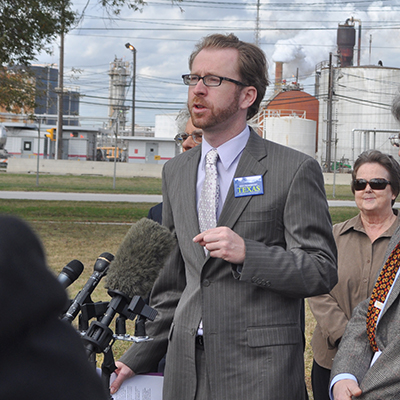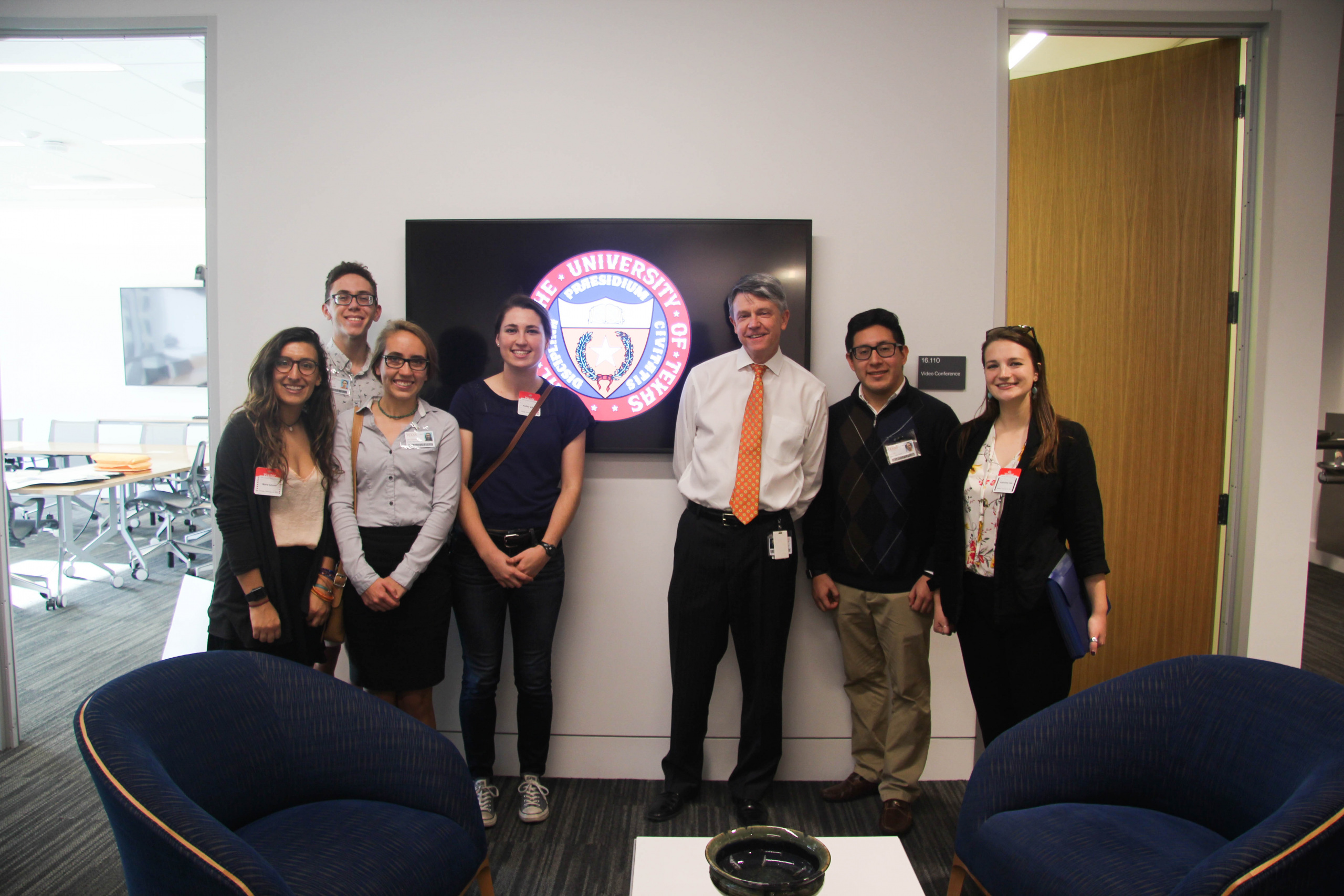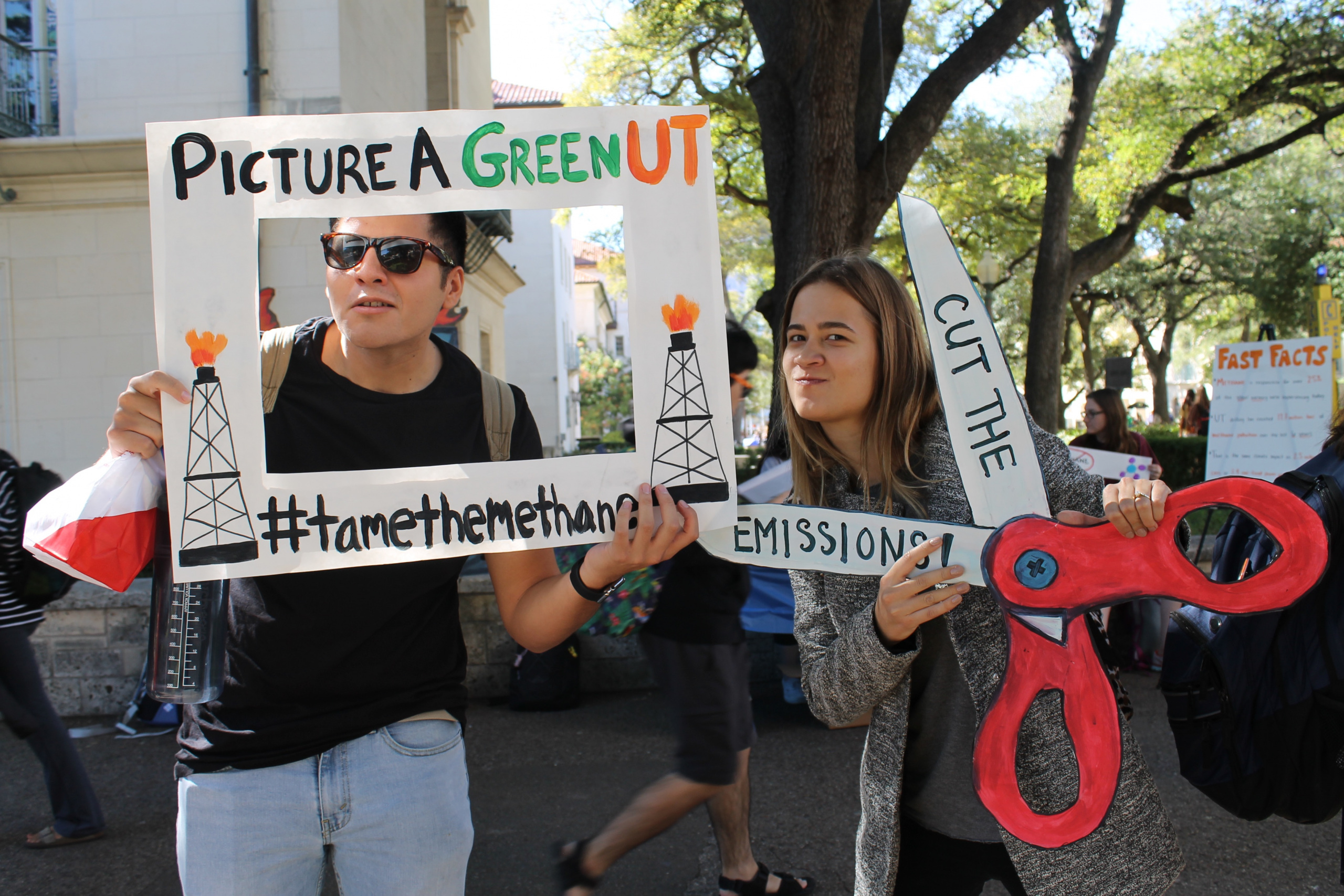
Faculty call on UT to cut methane pollution from oil wells
Momentum is building in our work to get UT to cut pollution leaking from their lands.
Yesterday, the UT Faculty Council voted unanimously in support of a resolution asking Chancellor McRaven to create a task force to address methane pollution leaking from 9000 oil and gas wells on University Lands. Last week, we delivered 1,120 new student petitions and letters signed by 77 members of the faculty, 40 alumni and 15 student organizations to the Chancellor’s office. UT students met with Vice Chancellor McBee, who was eager to hear about student environmental concerns. The students pointed out that 26 companies including Exxon, BP and Shell have announced methane reduction plans and urged University Lands to follow suit.

Students meet with Vice Chancellor McBee
There are approximately 9,000 oil and gas wells drilled on more than 2 million acres of land owned by the University of Texas. If University Lands was a state, it would rank 10th among oil producing states in the U.S.
The drilling has helped generate significant wealth for the UT System, but it often results in methane escaping into the air. Methane is a potent greenhouse gas 80 times more powerful than carbon dioxide and is responsible for 25% of current global warming. From Hurricane Harvey to California wildfires, the effects of global warming-fueled extreme weather are here and we must act to prevent those effects from getting even worse.
According to EPA data, from 2009 to 2014, oil and gas on University Lands produced the equivalent of 11.7 million tons of climate pollution. This pollution carries the same short term climate impact as 2.5 million cars or 3.4 coal-fired power plants in one year.
Simple and affordable modifications to oilfield operations can cut methane emissions dramatically. For example, high-bleed pneumatic devices can be replaced with low-bleed or no-bleed pneumatic devices.
Other oil and gas states, like Colorado, California and Wyoming, as well as ExxonMobil have started implementing these strategies to reduce emissions, but other companies that drill on UT land aren’t required to follow these best practices.
The UT System’s Sustainability Policy states “the U. T. System’s commitment to energy savings goals, reductions in carbon emissions, and sustainable design is evident in existing practices, and the institutions will continue to implement well-thought-out initiatives that increase efficiencies, reduce emissions, and promote sustainability practices that contribute meaningfully to the environment, while still achieving excellence in higher education.”
University Lands (UL) already requires oil and gas companies to meet higher standards on land management and water conservation. We’re just asking to require best practices for their leaseholders on methane too. Upon our request, the Environmental Defense Fund ran the numbers and found operators on UL could collectively reduce their emissions 48% and save $4 million. That’s because by capturing methane they can sell the gas and more than pay for the capital investment. And for smaller operators who may have trouble with the upfront capital costs, a philanthropy has offered to create a revolving loan fund.
UL recently announced that two developers had been awarded contracts to build solar farms on the lands. This is important progress, but more needs to be done to reduce the pollution coming from UT’s oil and gas operations. The technology is available, companies are using it, students and faculty demand it, and the climate really needs it.

Authors
Luke Metzger
Executive Director, Environment Texas
As the executive director of Environment Texas, Luke is a leading voice in the state for clean air and water, parks and wildlife, and a livable climate. Luke recently led the successful campaign to get the Texas Legislature and voters to invest $1 billion to buy land for new state parks. He also helped win permanent protection for the Christmas Mountains of Big Bend; helped compel Exxon, Shell and Chevron Phillips to cut air pollution at four Texas refineries and chemical plants; and got the Austin and Houston school districts to install filters on water fountains to protect children from lead in drinking water. The San Antonio Current has called Luke "long one of the most energetic and dedicated defenders of environmental issues in the state." He has been named one of the "Top Lobbyists for Causes" by Capitol Inside, received the President's Award from the Texas Recreation and Parks Society for his work to protect Texas parks. He is a board member of the Clean Air Force of Central Texas and an advisory board member of the Texas Tech University Masters of Public Administration program. Luke, his wife, son and daughters are working to visit every state park in Texas.
